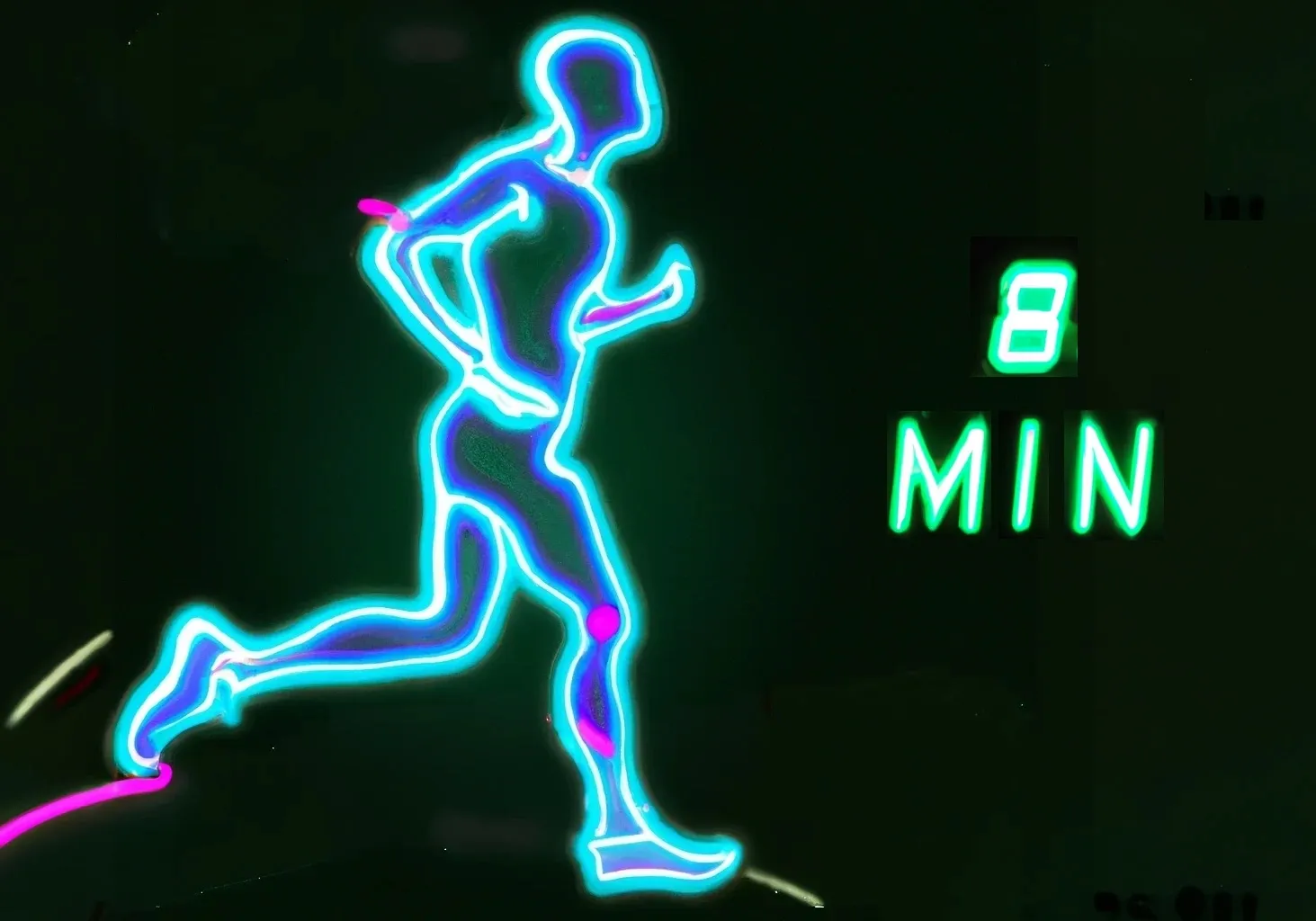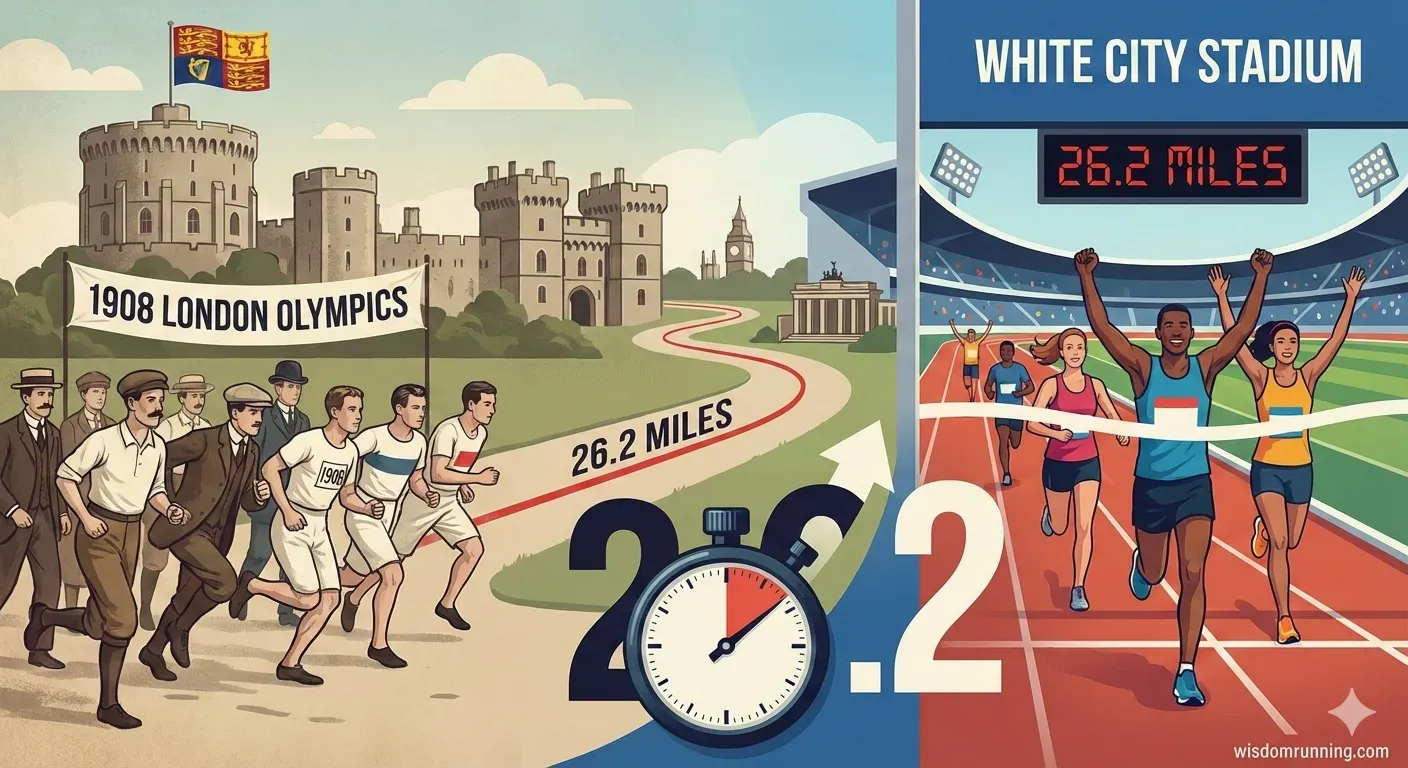An eight-minute mile sounds close until you try to hold it when your breathing spikes and your legs get heavy. Train it the wrong way and you can stall for months, or rack up aches that stop your progress.
This guide is built from pacing math, proven workout progressions, and evidence-based training principles. We reviewed the common plans people follow, then pressure-tested them into a simple, repeatable approach.
You’ll learn how to check your current fitness, set realistic split targets, choose the right workouts for your weak link, and validate that the pace is sticking. If you want to run 8:00 without guessing, start with your baseline.
How Fast is 8 Min a Mile?
With the 8-minute mile pace, you will be faster than 50% of runners in an average public long-distance race. In the table below, you can find a target time and a relative position in the race result list, which you can reach with an 8-minute mile pace on 5k, 10k, half-marathon, and marathon running races.

8-Minute Mile Splits and How to Pace the Attempt
Most missed 8-minute miles come from pacing errors, not a lack of grit. The fix is simple: practice the pace in small, repeatable chunks, then stitch it together on test day.
On a standard track, one mile is four laps. An 8:00 mile equals 2:00 per 400m. That also means 1:00 per 200m, 4:00 per 800m, and 6:00 at 1200m. If you can hit those split targets in practice, you are teaching your body what “eight-minute mile pace” feels like.
For the actual mile attempt, start controlled. If you sprint the first lap, you will pay for it later. Aim to run lap one a touch relaxed, then settle into rhythm on laps two and three. Save your hardest push for the final 400m. During the whole effort, think quick steps and quiet upper body. Keep your shoulders down, your hands relaxed, and your torso tall with a slight forward lean from the ankles.
Use one workout per week to rehearse the pace (keep the other runs easy):
- 6 x 400m at 2:00 per rep, with an easy 200m jog between reps.
- 8 to 10 x 200m at 58 to 60 seconds per rep, with easy jogging back to the start.
If you cannot hold the split yet, slow the reps slightly and shrink the recovery over time. Retest the mile every few weeks and track your lap splits. The goal is steady laps, not a heroic first one.
Who Can Run an 8-minute Mile?
As was covered in the previous article, every beginner runner can train to run one mile in 8 minutes. Although to keep an eight-minute mile pace at longer distances, like 10k or a half-marathon, a lot of physical strength, endurance, and training is required.
How Long Will It Take to Train For an 8-minute Mile?
The time it takes to train your body for an 8-minute mile pace is from 2 months to 3 years, depending on the desirable distances and the runner's initial physical fitness. The shorter distance and the fitter you are—the less time is required to train for an 8-minute mile pace.
1 mile at an 8-minute mile pace. It will take up to 2 months of training to run one mile at an 8-minute-per-mile speed. You should train three times per week every other day.
5k at an 8-minute mile pace. If you can run 3.1 miles at any pace, preparing for an 8-minute per mile will take 6-8 months. You should train 3-4 times a week with a rest day between workouts.
10k at an 8-minute mile pace. If you can run 6.2 miles without transitioning to walking, training for an 8-minute mile will take 8-12 months. You should train 3-4 times per week every other day and complete 20-30 miles weekly.
Half-marathon at 8-minute mile pace. If you can jog 13.1 miles non-stop, preparing for an 8-minute-per-mile speed will take 12-24 months. You should follow a comprehensive training program and log 30-40 miles weekly.
Marathon at an 8-minute mile pace. If you've already completed your first marathon, training for an 8-minute mile at a marathon will take 1.5-3 years. You should train consistently, follow an advanced running plan, have active recovery, and run 40-50 miles weekly.

How to Train to Run 8 Min a Mile? Types of Runs and Exercises
To run at an 8-minutes per mile, you need to improve your body’s strength, endurance, and speed. The dedicated exercises will bring your running to the next level.
Enhancing strength. Runners actively employ only two muscle groups: legs and abs. Strength exercises will pump these muscles and prepare them for an 8-minute mile pace.
Here is a list of the exercises tailored to legs:
- Step-ups
- Walking lunges
- Jump Squats
- One-Legged Heel Raise
For abs:
- Crunches
- Plank
- Lying Leg raises
Complete the exercises one by one and repeat the cycle 4-7 times. Mixing the abs and leg exercises gives every body part a gradual load and enough recovery time. Strength exercises 1-2 times a week are enough for noticeable progress.
Improving endurance. A long run is a vital weekly workout if you train for a long-distance race. Usually, runners schedule longs for Sunday—the same day that most races take place. As the title states, Sunday training should be the longest of your week, ideally up to 1.5-2.5 hours, with the average heart rate under 145 bpm (Zone 2). No worries if you can't run for 1.5 hours yet—make it the most extended weekly training and slowly increase the time and distance week by week.
Increasing speed. A speed workout once a week is essential for an 8-minute mile pace. The best exercise to boost your body’s speed is interval running.
It is a combination of fast and slow segments. The short sections are usually 3-4 times longer than the recovery ones. Run the quick parts at a threshold heart rate zone, and for the recovery ones, do as slowly as you can. Here are the most popular types of interval workouts:
- 1 minute running at a challenging pace, afterward walking 60 seconds
- 3 minutes at your tempo pace, followed by a 90-second jog as slowly as you can
- 1/2 mile fast running with 1000 feet recovery
- Run 1 mile fast and then transition to a slow pace for 2000 feet
- 10 minutes at a rapid pace, then jogging for 2 minutes
Every high-intense workout should start with a 2-3 minute slow run to warm up muscles and finish with the same to cool your body down. Speed workout more than once a week leads to fatigue and injuries — do not overdo it.
What Equipment is Needed to Train for 8-Minute Mile?
Sports equipment shouldn't be a blocker for you at any time. With 8 min a mile pace, you need only comfortable sneakers and a smartphone.
Running shoes. Any old and ugly sneakers you are running in right now are much better than new and pretty ones on the store shelf. Versatile daily training shoes from Brooks, Saucony, Nike, Asics, Adidas, or New Balance will be perfect. At this point, you won't get a boost from carbon plates and sophisticated materials. So, avoid marketing fuss and expensive technologies.
A fitness tracker or a mobile app makes tracking distance, time, and pace easier. You can use your phone with a free running app, like Strava, Runkeeper, and Runtastic, or a fitness tracker from any brand.
Pro Tips for an 8-minute Mile Pace
Track your training. Keep a sports diary or buy a subscription with a running app to record your weekly mileage and achievements. Knowing specific numbers will help you better plan training and distribute effort.
Review your diet. Since the runner’s body burns a lot of calories, you should compensate for them, ideally with healthy carbs. Stay away from running when you are full or hungry.
Drink water more. Drink before a run, after training, and in the middle of a workout. Eliminate the risk of dehydration; otherwise, your energy level will go down, and your muscles will refuse to work.
Get good sleep. Sleep is the best recovery tool. Have at least 7 hours of sleep to reduce fatigue and have enough energy for training.
Rotate the routes. So that training doesn't seem boring. Running near a lake or park is more fun than making circles or wading through traffic. Most runners find it easier to run in the morning and evening.
Stretching. Stretch routing is a vital activity that helps your body recover quicker and prevent injury. Stretch your muscles after each run (not before), on rest days, when you feel DOMS (delayed onset muscle soreness), and perform an especially thorough stretching after races.
Running buddy. Run with someone better than you. You will progress quicker by following the leader, replicating techniques, and getting helpful feedback.
What Not to Do While Training for an 8-min Mile
Run at the same pace each run. Research has shown that progress will take longer when running at the same speed every training. Our bodies require both challenge and recovery to progress quicker.
Challenging your body at each run. Doing your best in the competition is justified; however, jogging closely to the 8-mile pace during training will inevitably bring exhaustion and muscle injuries.
Run every day. If you can't run eight minutes per mile yet, avoid running two days in a row. A rookie mistake is to exhaust your body by jogging every day. In my experience, it does more harm than good; train every other day instead.
Continue regardless of pain or discomfort. There is a fine line between running your best and harming your body. Most runners don't feel the difference. If you feel sudden or unusual pain in muscles or body—it's better to stop and switch to walking. If you don't feel relief in a while or the pain repeats, consult with a physician at your earliest.
Postpone start. Our mind can generate excuses at the speed of thought: bad weather, no time, not in the mood, starving, full, feeling tired, no running shoes, etc. These are the mind games each athlete experiences. Set a distinct goal to run a mile at an 8-minute mile pace, make training your priority, and get yourself outside. Once you're on the street, the excuses will disappear at once.
That's it. I hope you achieve your perfect 8-minute mile soon. Good luck!
FAQs about 8-min mile
What percentage of the population can run an 8-minute mile?
About 7% of the US population, or every 15th person in the USA, can run an 8-minute mile or faster. In most public running events, an 8-minute mile pace will get you above half of your competition on the finish list.
What is an eight-minute mile pace in mph and per kilometer?
An eight-minute mile is 7.5 mph on a treadmill. It is about 4:58 per kilometer (roughly five minutes per km). If you train by effort, it should feel like “comfortably hard” when you hold it for more than a few minutes.
Is an eight-minute mile “good,” and what race times does it match?
An eight-minute mile is a solid recreational running pace, especially when you can repeat it for several miles. At that pace, you are looking at about 24:51 for a 5K, 49:43 for a 10K, 1:44:53 for a half marathon, and 3:29:45 for a marathon. Your actual race time can shift with hills, heat, and pacing skill.
How long does it take to run an eight-minute mile?
It depends on your current fitness, weekly consistency, and how well you recover. Many runners move fastest by building weekly mileage first, then adding one faster workout per week. If you have to guess, think in months, not days.
What workouts help me hold an eight-minute pace?
The most effective approach is one “comfortably hard” session each week plus easy mileage the other days. Try one of these once a week: six x 400 meters at around 1:55 to 2:00 with easy jogging between, or three x one mile at 8:00 with three-minute easy jogs. Keep the rest of your runs easy so you can hit the quality session with decent legs.
What should my easy pace be if I am training for eight-minute miles?
Your easy pace should feel easy enough to talk in full sentences. For many runners, that ends up one to two minutes slower per mile than goal pace, but effort matters more than the watch. If easy days turn into “sort of hard,” your faster workouts usually stall.
Why can I run eight minutes for one mile but not for three miles?
You probably have the speed but not the stamina at that effort yet. Build your aerobic base with longer easy runs and practice steady “tempo” running, which is hard but controlled. Also check pacing: going out at 7:30 and hanging on rarely turns into a smooth eight-minute average.
Should I focus on cadence or stride length to hit eight-minute pace?
Focus on a quick, relaxed cadence first, then let stride length come from stronger push-off and better fitness. Overstriding (reaching your foot too far forward) often makes eight-minute pace feel harder than it needs to. A simple cue is to land with your foot closer to under your hips, then drive back.
When should I stop trying for eight-minute pace and get medical help?
Stop running and get medical help if you have chest pain, fainting, severe shortness of breath that does not settle quickly, or new weakness or numbness. Also get checked if you have sharp pain that changes your gait or pain that worsens each run for a week. For typical soreness and heavy breathing, back off for a few days and rebuild with easier effort.



